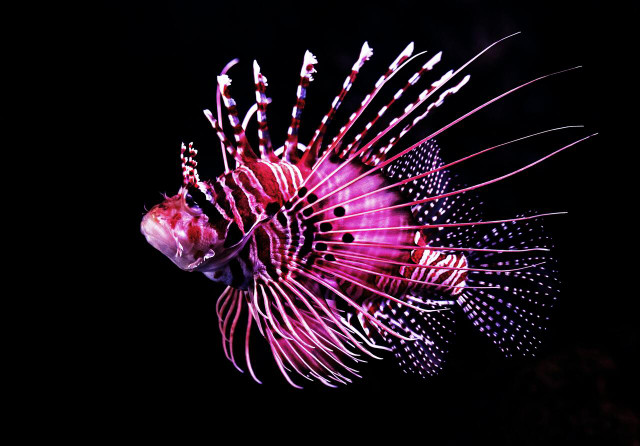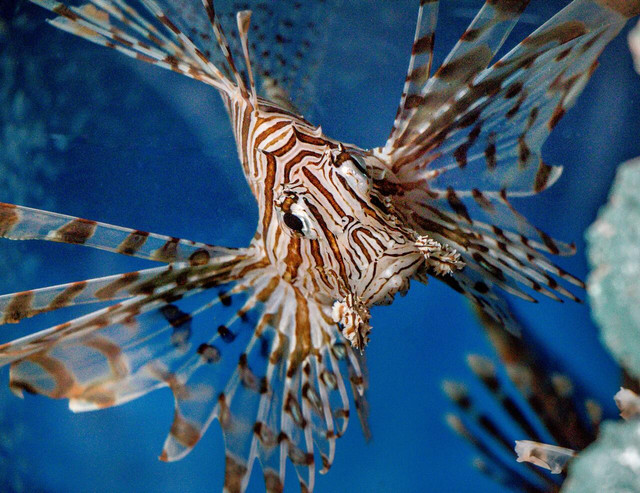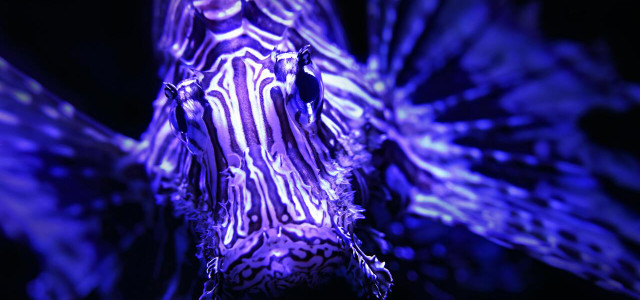Lionfish are bright, flashy, and one of the deadliest creatures in the ocean. Keep reading to discover why lionfish are poisonous and how you can treat their venomous stings.
(Foto: CC0 Public Domain / Unsplash / Alberto Bogo)Lionfish are native to coral reefs in the warm South Pacific and Indian Oceans. Over the past decades, they have expanded to coral reef ecosystems all around the world, including those in the Atlantic Ocean, the Caribbean and the Gulf of Mexico.
Lionfish were first reported in U.S. waters in the 1980s when they were spotted off the coast of Florida. They are easily distinguishable from other fish species due to their striking brown and white stripes, fan-like fins and long, defensive spines. In the right conditions, they can grow up to 14 inches in length.
They are meat-eaters, primarily dining on marine fish and invertebrates — in fact, researchers estimate that lionfish can reduce the number of native fish living in a coral reef by up to 79 percent. This makes lionfish an invasive species, as they eat fish already living in the ecosystems and coral reefs they migrate to.
In the Pacific and Indian oceans, sharks, eels and cornetfish are the lionfish’s most notable predators. Keep reading to find out what to do if you are stung by a lionfish.
What Are the Symptoms of Lionfish Stings?

(Foto: (Photo: CC0 Public Domain / Unsplash / David Clode))
The sting of a poisonous lionfish, though not normally life-threatening, can cause some unpleasant symptoms. That’s because lionfish have sharp spines covered by a layer of powerful venom-producing glands.
If you are stung by a lionfish, you can expect to experience pain and swelling around where their spine touched you. For most people, the worst of the pain resides within a few hours; however, symptoms can last for several days.
Common symptoms of a lionfish sting include:
- Swelling
- Bleeding
- Irritation
- Numbness
- Pain
In more serious cases, stings can cause respiratory problems, severe muscle aches and even paralysis.
What To Do if a Lionfish Stings You



(Foto: (Photo: CC0 Public Domain / Unsplash / Ray Harrington))
If you are stung by a lionfish, seek medical treatment immediately — especially if you experience symptoms of infection at the site, respiratory difficulty or if you can’t remove the spines.
Divers are most likely to experience lionfish strikes, as the fish are commonly found in water up to 300 feet deep. This can make stings particularly problematic, as divers who are stung should surface quickly to receive medical attention but must do so safely and slowly enough to avoid the bends.
How to Treat Lionfish Stings:
- Remove the spikes. Gently remove any spines that remain in your skin.
- Disinfect the wound. Use antiseptic wipes to disinfect the wound.
- Apply heat. Lionfish venom is protein-based and will break down with the application of heat. Apply a rag soaked in non-scalding hot water to the wound. This helps with pain relief and breaks down the venom faster.
The conclusion is no, you don’t need to be scared of poisonous lionfish and shouldn’t panic if you’re stung — but definitely avoid swimming around them when possible.
Read more:
- Swai Fish: 5 Reasons Not to Eat Pangasius
- 8 Things You Can Do to Save the Ocean
- 7 Best and Worst Pond Fish: What to Look Out For
Do you like this post?







